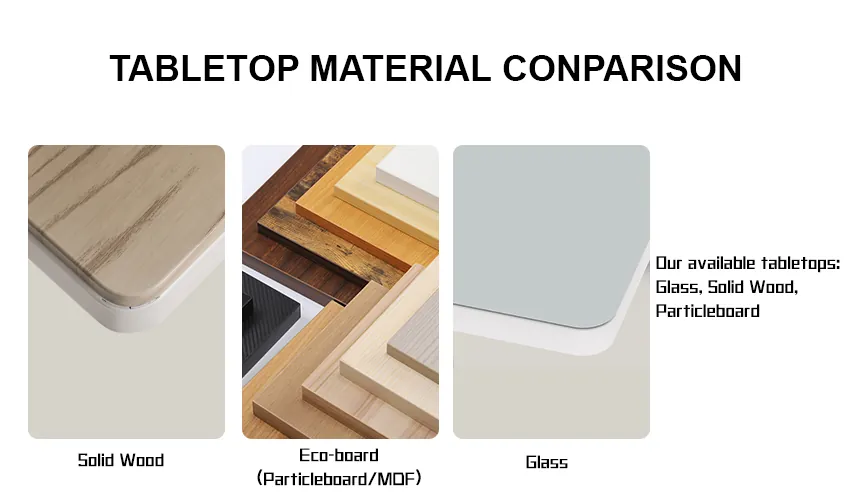In modern offices and homes, the lifting desk is highly valued for its health benefits for the cervical and lumbar spine. However, a high-quality lifting desk is not just about its core lifting function; it's also about the desktop panel, leg materials, and sophisticated production process. This article will provide a detailed analysis of the materials and manufacturing of lifting desks to help you make the most informed and healthy investment.
Lifting desk desktops are primarily made from eco-friendly particleboard/MDF, solid wood, and tempered glass. Each material has its own pros and cons, allowing you to choose based on your specific needs and preferences.
Particleboard/MDF (Eco-Friendly Engineered Wood)
Advantages: A mainstream choice for lifting desks. Made from wood and other non-wood fibers, it's pressed under high heat and pressure, resulting in a stable structure that is resistant to warping. The production cycle is short, costs are relatively low, and it offers excellent value for money. Reputable brands like Nate use E1-grade eco-friendly panels with formaldehyde emissions far below international standards, ensuring a healthy and environmentally friendly product.
Production Process Highlight: The edge banding process is crucial and directly impacts the lifespan of the desktop. Nate uses a fully automated edge banding machine for both straight and curved edges, ensuring uniform sealing at every position. This process includes gluing, trimming, cooling, and forming in one step, guaranteeing the integrity and stability of the edge seal. This effectively prevents moisture from entering the panel, which can cause swelling and bursting, thereby significantly extending the desktop's service life.
Solid Wood
Advantages: Made from natural solid wood, it is inherently eco-friendly, sturdy, and has a soft texture and luster. It is an excellent choice for those who value natural aesthetics and sustainability in a home office setting.
Disadvantages: It is expensive and requires careful maintenance. Extremely dry or humid environments can cause the wood to warp or crack.
Tempered Glass
Advantages: Offers a clean, modern aesthetic, is wear-resistant, stain-resistant, and very easy to clean. Many gaming-style desks use this material, which, combined with a large mouse pad, provides an immersive gaming experience.
Disadvantages: The surface can be reflective, which may cause eye strain during prolonged use. In colder regions, the surface can feel cold to the touch.

The stability and load-bearing capacity of a lifting desk directly determine its user experience. There are clear differences in the quality of desk leg materials and motor configurations.
Preferred Order for Desk Leg Materials:
Cold-Rolled Steel: The top choice, offering the best quality. Cold-rolled carbon steel plates provide excellent strength and stability, effectively preventing the desk from shaking during use.
Aluminum Alloy: Lightweight and corrosion-resistant. This is a good choice if portability is a high priority.
Ordinary Steel: Offers general strength and stability, and is typically used for lower-end products.

Motors and Stability:
A lifting desk's stability is primarily related to the number of motors. A dual-motor system offers superior synchronization, load-bearing capacity, and stability compared to a single-motor system, ensuring the desktop remains steady throughout the lifting process.
Load-Bearing Performance: A higher load-bearing capacity is always better, as it determines the maximum weight the desk can safely support, such as multiple monitors and a computer tower.
When selecting a lifting desk, you should consider the following factors:
Desktop Material: Choose between eco-friendly engineered wood, solid wood, and tempered glass based on your personal preference, use case, and budget.
Production Process: Pay attention to details like the edge banding, as this is a key factor in the product's durability.
Desk Leg Material: Prioritize cold-rolled steel legs for the best stability and load-bearing performance.
Motor System: For the ultimate stable and smooth lifting experience, a dual-motor configuration is highly recommended.
A high-quality lifting desk can effectively relieve your lumbar and cervical spine fatigue, providing you with a healthier and more comfortable work and life experience.
